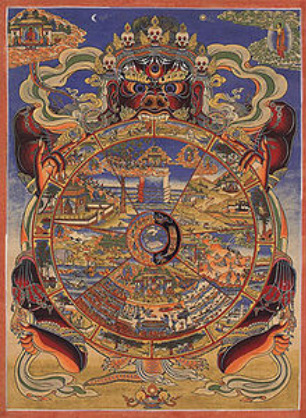The four ends

Tibetan 'Wheel of Life'; Wikimedia Commons
The Indian doctrine of the four ends. Originates in Hinduist religion. Buddha ("The Illuminated One") sought the fourth end at the foot of the Bodhi tree (tree of awakening). In this endeavour the first three ends were his antagonists (also called the trivarga: the aggregate of three).
Kama - physical or emotional pleasure
Artha - power and success; material prosperity
Dharma - lawful order and moral virtue; righteousness
Moksha - release from delusion; detachment, liberation (called Nirvana in Buddhism)
The Indian doctrine of the four ends, as found in different varieties dependent on whether one takes a Hinduist or Buddhist approach. Buddha ("The Illuminated One") sought the fourth end at the foot of the Bodhi tree (tree of awakening). In this endeavor the first three ends were his antagonists (also called the trivarga: the aggregate of three). Kama must not be confused with Karma.
Karma - may have its origin in the shramana tradition of which Buddhism and Jainism are continuations. This tradition influenced the Brahmanic religion in the early Vedantic (Upanishadic) movement of the 1st millennium B.C. In Hinduism, karma is not punishment or retribution, but an extended expression or consequence of natural acts. Karma means "deed" or "act" and more broadly names the universal principle of cause and effect.
In Hinduism, purusãrtha refers to a goal of human existence, and there are four such purusãrthas:
Kama - physical or emotional pleasure;
Artha - power, success, and material prosperity; ;
Dharma - lawful order and moral virtue;
Moksha - release from delusion.
Karma - may have its origin in the shramana tradition of which Buddhism and Jainism are continuations. This tradition influenced the Brahmanic religion in the early Vedantic (Upanishadic) movement of the 1st millennium B.C. In Hinduism, karma is not punishment or retribution, but an extended expression or consequence of natural acts. Karma means "deed" or "act" and more broadly names the universal principle of cause and effect.
In Hinduism, purusãrtha refers to a goal of human existence, and there are four such purusãrthas:
Kama - physical or emotional pleasure;
Artha - power, success, and material prosperity; ;
Dharma - lawful order and moral virtue;
Moksha - release from delusion.